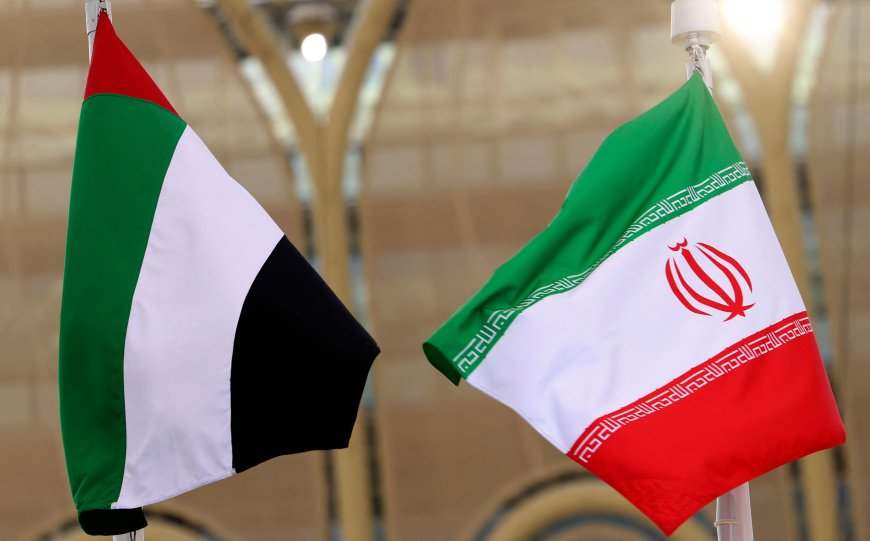From Rivalry to Partnership: How Iran’s Diplomatic Outreach to the UAE Can Spark a Regional Renaissance
The recent visit of the Foreign Minister of the Islamic Republic of Iran to the United Arab Emirates (UAE), following his engagement with Chinese officials in Beijing, underscores Iran's dynamic and proactive diplomatic strategy aimed at recalibrating its regional role and fostering closer ties with both regional and global partners. In a rapidly evolving geopolitical environment, this visit represents a significant effort to redefine Iran's position, reduce tensions, and explore avenues for strategic cooperation in the Middle East.

By: A. Mahdavi
The recent visit of the Foreign Minister of the Islamic Republic of Iran to the United Arab Emirates (UAE), following his engagement with Chinese officials in Beijing, underscores Iran's dynamic and proactive diplomatic strategy aimed at recalibrating its regional role and fostering closer ties with both regional and global partners. In a rapidly evolving geopolitical environment, this visit represents a significant effort to redefine Iran's position, reduce tensions, and explore avenues for strategic cooperation in the Middle East.
The swift pace of developments in the region has compelled countries to reassess their strategies, realign their priorities, and maximize their advantages within the emerging order. Against this backdrop, Iran’s outreach to the UAE can be interpreted as a calculated move to address bilateral differences, reduce tensions, and identify mutually beneficial solutions to ongoing disputes. The willingness demonstrated by both sides to engage in dialogue reflects their shared recognition of the value of diplomacy in preventing escalation and fostering stability.
One critical dimension of this engagement is the potential for Iran and the UAE to collaborate in balancing Turkey’s expanding regional influence. The rivalry between Turkey and the UAE has intensified across multiple theaters, including Syria, Yemen, and Sudan, creating a unique opportunity for Iran to position itself as a key player in regional power dynamics. By cultivating closer ties with the UAE, Iran can contribute to a recalibrated balance of power that curtails Turkey’s influence while advancing shared interests.
In Syria, the divergent agendas of Turkey and the UAE highlight the complexities of regional competition. Turkey, invoking its historical and ideological commitments to the region, seeks to solidify its military and political presence in northern Syria through policies rooted in Islamism. Conversely, the UAE aims to counter Turkey’s ambitions by supporting opposition groups and bolstering nationalist forces in Syria. This dynamic presents an opportunity for Iran to align with the UAE on areas of convergence while leveraging its influence to mediate and mitigate regional conflicts.
The potential for Iran-UAE cooperation extends beyond Syria. In Yemen and Sudan, both nations face overlapping yet distinct challenges. While conflicts of interest persist, the UAE’s concurrent rivalry with Turkey in Sudan offers Iran a strategic opportunity to mediate and assert its role as a stabilizing force. By capitalizing on these tensions, Iran can enhance its regional influence and demonstrate its capacity for conflict resolution. This necessitates a clear identification of shared interests with both the UAE and Turkey, allowing Iran to craft a diplomatic framework that maximizes its geopolitical leverage.
The Foreign Minister’s visit also addressed broader issues, including the future of Syria and Yemen. Here, Iran’s approach must be guided by its national interests, drawing on its domestic resilience and political capital to secure long-term gains. Iran’s alliances with major powers like China and Russia, both of which maintain strong ties with the UAE, further bolster its capacity to influence regional outcomes. The alignment of interests among these partners can amplify Iran’s ability to pressure regional rivals and advance its strategic objectives.
Iran’s diplomatic outreach must also be viewed within the broader context of its evolving regional doctrine. By redefining its goals and adopting adaptive strategies, Iran seeks to enhance its deterrence capabilities and preempt the escalation of direct conflicts. This requires the cultivation of regional partnerships, the identification of common interests, and the utilization of emerging rivalries to Iran’s advantage. For instance, in Sudan, Iran can engage with both Emirati and Turkish stakeholders, leveraging their competing interests to secure concessions and achieve its objectives.
Ultimately, the visit signals Iran’s intent to strengthen its relationships with Persian Gulf nations and foster collaborative mechanisms to address shared challenges. The shared concerns of Iran and the UAE regarding Turkey’s assertive policies create fertile ground for diplomatic and economic cooperation. By building regional coalitions and managing crises collaboratively, Iran and the UAE can enhance economic integration, reduce tensions, and stabilize conflict zones.
This rapprochement offers Iran a valuable opportunity to bolster its influence in the Middle East while improving ties with Arab nations. Through strategic engagement and active diplomacy, Iran is poised to redefine its regional role, assert its interests, and contribute to a more balanced and cooperative Middle East. The visit to the UAE, following the dialogue with China, exemplifies Iran’s commitment to a multifaceted approach that leverages partnerships, mitigates conflicts, and lays the groundwork for a stable and prosperous regional order.













































